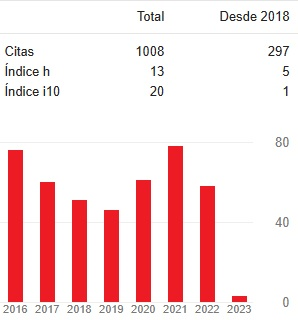SAN MIGUEL PÉREZ, Enrique (2020). La soberanía del derecho sobre la fuerza. Abogacía, justicia y literatura. Madrid. Editorial Dykinson, 204 páginas
Keywords:
advocacy, Justice, literatureAbstract
The sovereignty of the right over force is an evocative title that starts from the duality of the concept of law, which can be understood as a set of norms that, for its imposition, requires the use of force. The law could be considered a class of codified force, while, on the one hand, there is no force that does not have some kind of form, the right must be a concrete formalization oriented to fulfill collective ends and based on certain moral principles. Jurisprudence is then conceived as a valuable instrument of legitimation and perpetuation of political power, the only one that holds the use of legitimate force. A wide intellectual tradition supports this interconnection, in the words of Rousseau (2017): "The strongest is never strong enough to always be the lord, if he does not transform his strength into right and obedience into duty" (p. 3). The work of Enrique San Miguel Pérez starts from this dual character of the concept of law to focus his study on the practice of law through the use of literary sources as an instrument of analysis of those moral principles to which the right to what has tended. throughout history.
Downloads
References
Gellner, E. (1988). Naciones y nacionalismo. Alianza.
Jaeger, W. (2001). Paideia: Los ideales de la cultura griega. Fondo de cultura económica.
Mosse, G. (2019). La nacionalización de las masas. Marcial Pons.
Rousseau, J.-J. (2017). El contrato social. PRD.
Downloads
Published
How to Cite
Issue
Section
License
The Fundación Universitaria Española publishing house preserves the patrimonial rights (copyright) of published works, and encourages and allows their reuse. The works are published in the electronic edition of the journal under a license “Creative Commons Atribución/Reconocimiento-NoComercial 4.0 Licencia Pública Internacional — CC BY-NC 4.0”, and can be copied, used, disseminated, transmitted and publicly exhibited, provided that : a) the authorship and original source of its publication is cited (journal, publisher and URL of the work); b) are not used for commercial purposes; c) the existence and specifications of this license of use are mentioned.
The author / s partially transfer the property rights (copyright) of this work to the Fundación Universitaria Española (Spain) (NIF: G28433670), for the printed and online editions.
It also declares to have respected the ethical principles of research and to be free from any conflict of interest.
«C.I.H.» encourages the authors and the scientific community to the maximum promotion and dissemination of the works in their final version through:
1) Your list of contacts (emails) and social networks (Facebook, Twitter, LinkedIn ...).
2) Institutional repository of your University and public repositories (Mendeley, Cosis ...).
3) Scientific social networks (ResearchGate, Academia.edu, Kudos ...).
4) Personal or institutional website, blog, etc.
5) Google Scholar, ORCID, ResearchID, ScopusID, Dimensions, PlumX ...
6) Printed copies purchased directly and sent to specialists for reading and subsequent citation if appropriate.
For the nomination of future articles by authors of "C.I.H.", the impact of previous works will be taken into account, so that those with citation higher than the annual average of the journal will be preferred.








2.jpg)
















1.png)
1.png)

1.png)


.png)
.png)

.png)
1.png)
1.png)
